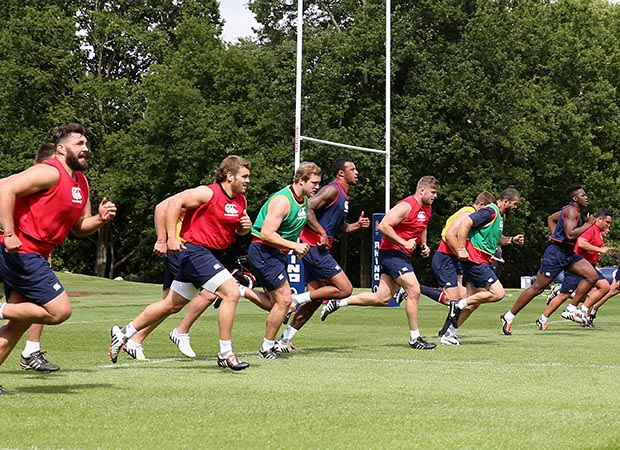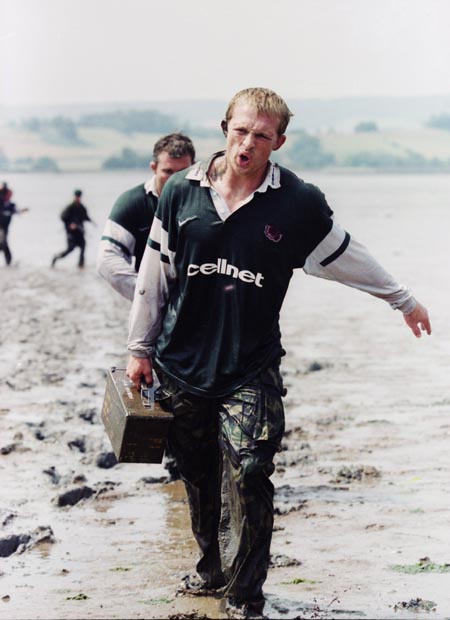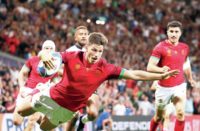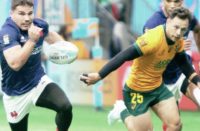 The thing about World Cup camps is that the handbrakes come off and, especially among Tier One Nations, the notoriously tight-fisted Union treasurers can finally be persuaded to loosen the purse strings.
The thing about World Cup camps is that the handbrakes come off and, especially among Tier One Nations, the notoriously tight-fisted Union treasurers can finally be persuaded to loosen the purse strings.
When you are chasing the ultimate prize there is a strong inclination to try anything and everything that could possibly give you an edge, mental or physical.
In 1987, New Zealand, canny as ever, adopted a twin pronged approach. They packed a New Zealand Barbarians full of young guns off to tour Britain while a pastoral approach was taken by coach Sir Brian Lochore when he finally gathered his troops three weeks before the inaugural competition.
Lochore badly wanted his team to reconnect with the New Zealand public, many of whom had been embarrassed and disgusted by the 1986 New Zealand Cavaliers tour to South Africa which took place amid rumours the players had been lavishly rewarded for offering succour to the decaying apartheid regime.
So he arranged for them to go bush in rural Wairarapa where all the players were billeted out with normal families for the night.
“I actually wanted them to go for two nights, really mix with the families and communities, but they were a little uneasy, so I made it one,” recalls Lochore. “They rode horses and motorbikes, went shooting and fishing and enjoyed mountains of home cooking and then, when we were on the bus back to Wellington, in unison they said, ‘why couldn't we stay two nights?' My answer wasn't repeatable.
“It was a good start. It had been so rough on a lot of players at one stage that they wouldn't go downtown with anything identifying them as All Blacks in case of abuse. But by the end of the tournament they were very proud to walk down the street and be acknowledged.
England in 1991 was an odd one. The RFU were fighting the spectre of professionalism tooth and nail and the prospect of a funded World Cup camp with, possibly, calls for what would have amounted to ‘broken-time' payments was unthinkable. Instead they expected the players to take a month's leave to undertake a seven-match, month-long, tour of Fiji and Australia, the theory probably being that employers would look more kindly on “official” England duty as opposed to a camp which might be construed as a “jolly”.
The players then had to take another six weeks' holiday for the tournament itself. Remarkably England arranged a further three warm-ups – USSR, England Students and Gloucester – making it ten games in all between their Grand Slam decider against France in March and their World Cup opener against New Zealand.
Frankly it was a wonder so many of the squad were still in one piece.
England really started to veer left field a tad with their 1999 World Cup camps and training under Sir Clive Woodward who took his charges to the Commando training centre at Lympstone for four days to see what they were made of.
It was a little too late for 1999 but 11 of the team that started the 2003 World Cup final had attended that Marines boot camp, and subsequent return visits, and Woodward has always put great store by the lessons learned and standards set.
The Marines organised a pretty strenuous package. Matt Dawson, determined to win a bet off Austin Healey, arrived at Lympstone with his golf clubs slung over his shoulder as he sauntered into the officers' mess. Well he got a laugh but nothing else and the Marines ensured he spent plenty of time hacking his way through the undergrowth over the coming days.
 There were the fairly exhausting but standard night navigation exercises across Dartmoor and complicated rope work – abseiling and bridge building – but also much more testing immersion challenges – escaping form a submerged helicopter after a simulated crash – and ‘rescuing' colleagues from a fire in a pitch black room filled with dense smoke.
There were the fairly exhausting but standard night navigation exercises across Dartmoor and complicated rope work – abseiling and bridge building – but also much more testing immersion challenges – escaping form a submerged helicopter after a simulated crash – and ‘rescuing' colleagues from a fire in a pitch black room filled with dense smoke.
A full scale fire fight with blanks was another afternoon that got the adrenaline pumping. Afterwards the officers in charge gave a succinct psychological run-down of all those involved, how they performed under stress which Woodward took good note of.
“Quality time spent in a camp like that is never going to be wasted in terms of bonding and team building,” recalls Woodward.
“We learned three very important things that first camp which stayed. The Marines taught us what an elite squad looked and felt like. When we first met them in the officers lounge, we were all standing around or casually laid back with legs hanging over the arms of the chairs or on the coffee tables.
“When the Marine officers came in looking immaculate and ready ‘to go' we looked a bunch of amateurs. We weren't but perception was everything.
“Secondly they talked constantly about ‘dislocated expectations' – how nothing ever quite works out as planned in intense situations. You have to keep reviewing, re-grouping and resetting goals. That was perfectly normal but a huge message for us to appreciate fully.
“And finally we adopted a phrase or mantra from the Marines who are constantly asking, ‘would you go into battle with him', when they're training and assessing troops. We adapted it a little to was somebody ‘ready to jump out of the helicopter?' Was a particular player ready for everything that might be thrown at him in a big match? It was a constant reminder of the faith and trust you need within a successful team.
By 2003 – having absorbed the lessons of the Marines and with a quickfire tour which garnered victories over New Zealand, New Zealand Maori and Australia under their belts – England had narrowed their World Cup camp focus. Fitness and rugby pure and simple.
An international standard pitch was laid at Pennyhill Park with the groundsman asked to produce a hard, fast, Australia-style track. Meanwhile an adhoc gymnasium was erected pitchside so players could work around the clock if they wanted. Some hotel kitchen staff had no other task than to produce ice for the dustbin style ice baths down at the gym as Woodward's squad sweated through a spectacularly hot summer.
“It was inspiring to go in there and hear the crash of weights and watch the guys egging each other on and doing new personal bests every day,” recalls Woodward.
“Players could do their stuff before a rugby session and straight after. They could do their stretching and ice baths as well. The physios set up a treatment table there. It was airy and bright and felt like an outdoor gym and it became the gathering spot as well. The camp worked brilliantly. There was a real feeling of clocking on for work first thing Monday morning and total focus all the way through to Friday night.
“Each week there'd be a minimum of three fitness tests, six weight sessions, five skills sessions, seven recovery sessions in addition to specific programmes for each player and time set aside for light-hearted games at the end of most days. There'd also be three enforced rest periods a week when players were encouraged to have a snooze in their rooms.”
The players loved it, even those who didn't initially make the squad for Australia.
“We up at the crack of dawn and not finishing until quite late so it was extremely intense,” recalls Simon Shaw who was eventually called out as a replacement. “You're shattered, day-in day-out for weeks on end. But you never want to let up and show weakness, because there were another three or four guys competing who all wanted the same as you. But at the end of the day, the atmosphere was just great as a professional. That kind of environment and competition is what you live for.”
England seem to be replicating that approach this year. This coming week they complete the initial beasting at Pennyhill Park with many of the squad having arrived a week early for a mini pre-camp. Meanwhile, when they get to Denver, Colorado, the emphasis will be very much on high quality rugby work, in conjunction with more conditioning that makes best use of the altitude.
Unless the England management have a surprise up their sleeves there will be no three-day survival expeditions in the Rockies hunting and eating bear and elk, abseiling down ravines and canoeing down rapids. Alter that it will be back to Pennyhill Park when the rugby takes over completely and the fine-tuning begins for the three warm-up matches.
Wales are moving about to keep things fresh but they have already been hard at in Wales for a month and are well into a two-week boot camp in Switzerland where they are adopting the old cycling adage of sleeping high but training low.
They are based at nearly 2200m at Feisch but are training lower down the valley. Next they move onto the 45-degree heat of Doha's renowned Aspire Sports complex where the facility's hypoxic chambers – capable of mimicking altitudes up to 4500m – will allow players to maintain altitude fitness.
Finally after their first warm-up game against Ireland on August 8, but before the return game on August 29, Warren Gatland will be taking is squad off to their old haunt at Spala in Poland where thrice daily cryotherapy sessions take centre stage. The main benefit of cryotherapy is that is accelerates the recovery time so Gatland, if he is minded, and he normally is, can organise three sessions a day.
The other, Southern Hemisphere, teams in the Pool of Death are much more match related in their preparations. World Cup camps are very much the preserve of whichever hemisphere is in its pre-season before a World Cup.
Australia are gathering in a small camp now before three full-on Rugby Championship matches this month and an additional friendly against Argentina in Mendoza. That will be followed by a rest, a quick top-up camp and then a warm-up match against USA in Chicago en route to England.
Uruguay, odds stacked against them, have been playing almost constantly, it seems, for three or four months and that process continues although moves are also afoot for them to spend a week or so in camp with Argentina.
Fiji, after a warm-up against New Zealand Maori, will spend the next five weeks or so playing Pacific Rim internationals before a short rest followed by a mini camp on the eve of their departure for Europe.
When gathered on the islands they do occasionally have sand dune running weekends which sounds horrendous. It was, however, the favourite fitness session of Britain's 1968 Olympic 400m hurdles champion David Hemery when he was in his pomp.


























